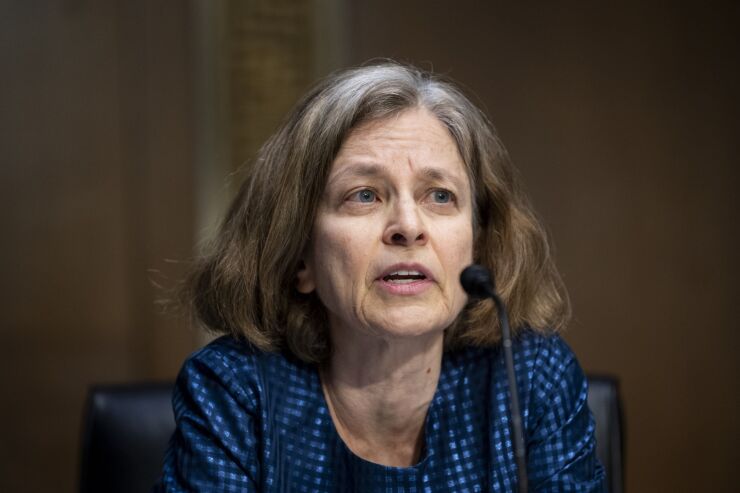WASHINGTON — Three White House nominees for the Federal Reserve Board received a warm welcome from the Senate Banking Committee’s Democrats and emerged relatively unscathed from Republican attacks on Thursday.
The three candidates — Sarah Bloom Raskin, Lisa Cook and Philip Jefferson — were pressed at length by senators on their views of climate risk regulation and the Fed’s regulatory independence.
Raskin, as the Biden administration’s pick for the Fed’s vice chair for supervision, took the brunt of Republican opposition. The hearing was at times contentious as GOP lawmakers alleged that Raskin was downplaying her interest in using the Fed’s power to address banks’ role in climate change.

“It seems very clear to me that you believe that climate change is a very, very dire, imminent threat,” said Sen. Pat Toomey, R-Pa., ”and for those reasons it is necessary and appropriate for financial regulators, including the Fed, to allocate capital away from those companies that are contributing the most to the carbon in the atmosphere. Isn't that true?”
Raskin sought to allay Republican concerns by repeating the same message several times throughout Thursday's hearing: “The Fed should not pick winners and losers,” she said.
In her opening remarks, Raskin testified that the vice chair for supervision’s role “does not involve directing banks to make loans only to specific sectors, or to avoid making loans to particular sectors. And the role exists within the laws passed by Congress that govern the Federal Reserve and its responsibilities.”
But power in the Senate rests narrowly with Democrats, making support from centrists like Sens. Jon Tester, D-Mont., and Mark Warner, D-Va., essential. On Thursday, both senators appeared to signal at least cautious support for Raskin and her fellow nominees.
Warner cited praise from individual bankers in Virginia, who he said had described Raskin’s regulatory record as “very fair.” And Tester said that he believed studying climate change was an important component of the Fed’s understanding of financial risk. “I think it's critically important that the Fed gets all the information that they can when they're dealing with risks to our financial system,” Tester said. “And I think that it is rather obvious that climate change has to be part of the information that you gather.“
While much of Republicans’ questions to Raskin revolved around climate change risk, Sen. Tim Scott, R-S.C., pressed the former Treasury Department official and Fed governor on whether she believed small-dollar lending had a role in the financial system.
Raskin responded by saying she believed that small-dollar loans are “a very important source of credit” as long as they can be provided in a safe and affordable manner.
One of the morning’s more notable exchanges occurred between Raskin and Sen. Cynthia Lummis, R-Wyo. Lummis is a crypto-industry advocate who has repeatedly called on the Fed to allow fintechs to have master accounts with the central bank — a funding source largely reserved for depository institutions.
Lummis appeared to allege that Raskin had played an improper role in helping Reserve Trust, a fintech that Raskin sat on the board of between 2017 and 2019, get approval for a Fed master account. Raskin had served as a Treasury official just months before joining Reserve Trust’s board.
"Something doesn't smell right with the way this played out," Sen. Lummis said during the hearing, claiming to have evidence that Raskin had called the Federal Reserve Bank of Kansas City to lobby on Reserve Trust’s behalf in August 2017.
Raskin responded to Lummis’s claims by saying: “Certainly, if you are suggesting anything improper, I want to make very clear that, first of all, I have had the honor to serve in various public capacities, and each time I left, I have been very mindful of the rules regarding departure.”
Cook, currently an economics professor at Michigan State University, also was criticized by Republicans, some of whom alleged that she did not have enough professional experience in monetary policy. Sen. Bill Haggerty, R-Tenn., claimed that her academic work seemed “more like social science” than economic research.
Cook responded that she was “proud of my academic background” and added that she had been “the target of anonymous and untrue attacks on my academic record,” pointing to the fact that she holds a Ph.D. in economics from the University of California, Berkeley.
Senate Banking Chair Sherrod Brown, D-Ohio, later came to Cook’s defense, saying in his closing remarks that Cook had been subject to “abhorrent” attacks from “the far-right blogosphere.”
Jefferson, a vice president, dean and economics professor at Davidson College, received a far friendlier welcome from Republicans during Thursday’s hearing. Toomey said in closing remarks that he believed Jefferson to be “eminently qualified, knowledgeable, [and] has the temperament and the experience to be a constructive contributor, and I look forward to supporting his confirmation.”
Brown told reporters earlier this week that he would aim to have a committee vote on the White House's Fed nominees on Feb. 15. It's unclear when the Senate as a whole will vote, as Democrats have lacked 51 votes in the Chamber since Sen. Ben Ray Lujan, D-N.M., was hospitalized after a stroke late last week.





